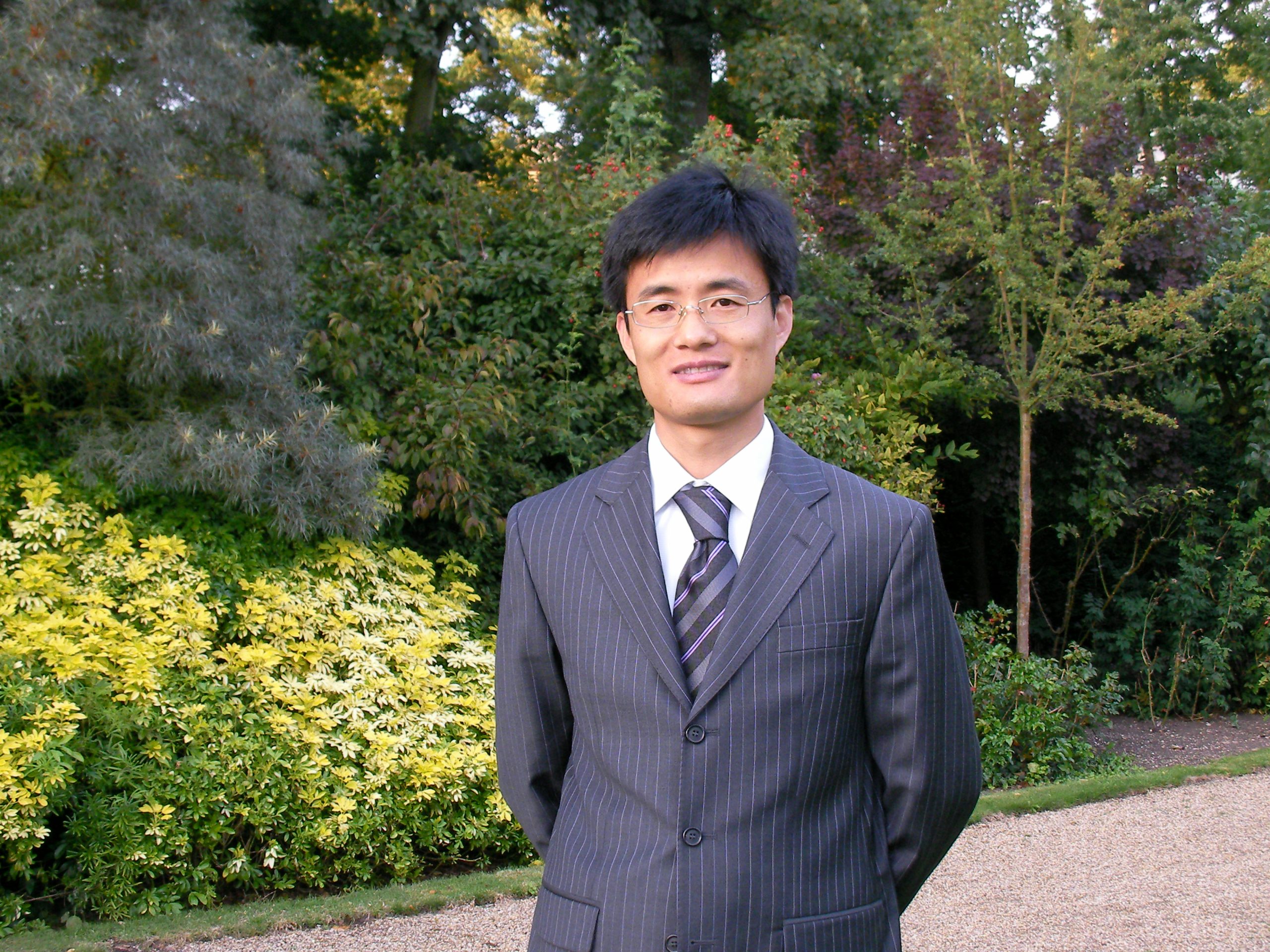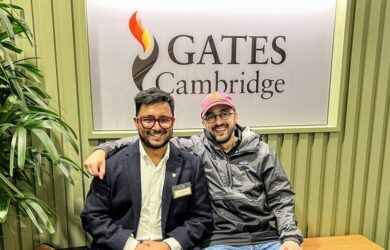
Dr Jimin Yu talks about the impact Cambridge - and Gates Cambridge - has had on his career as a leading researcher in the field of paleooceanography.
My research aims to understand how climate and ocean chemistry has changed in the distant past through analysis of miniature shells from different locations in the ocean.
Dr Jimin Yu
Dr Jimin Yu is an Associate Professor in the Research School of Earth Sciences at the Australian National University and an expert in paleoceanography. He says his time at the University of Cambridge, part of which was funded by the Gates Cambridge Trust, marked a big turning point in his life and changed his research direction towards paleoceanography and understanding the impact of climate change over millions of years in Earth’s development.
Cambridge is also where he met his wife, who was doing a PhD in the same department at the time.
Earth Sciences
Jimin [2002] was born in Linyi, Shandong province, China. It’s a town which has grown hugely in the last 25 years as China has become more industrialised. Jimin’s parents were both subsistence farmers. He has three older brothers – he and his eldest brother are the first in the family, and among the first in his town, to go to university.
Jimin enjoyed studying as a child which he attributes to having very good teachers. He went to his local primary school for five years and then to another school slightly further away for three years. He then sat a highly competitive exam and was admitted to the best high school in the area, living away from home during the week. Jimin excelled at maths and chemistry, but when he finished school and was looking to enter university he was not clear what he wanted to study. Initially he considered going to business school as he was interested in his future earning potential, but the course he applied for at Nanjing University, one of China’s top universities, was highly competitive. Instead he was offered a course in Earth Sciences, although he didn’t know much about the subject. It was to change his life.
It took Jimin a while to adjust to the new subject and he still feels a sense of regret that his disappointment about not getting into business school [“I wanted to do something that would help me get rich,” he says] meant he didn’t really become immersed in Earth Sciences until his third year. In the last two years of his four-year course he moved from foundational work in maths, physics and chemistry to learning more specific Earth Sciences knowledge, such as sedimentology. Even though he was highly ranked in his first two years, Jimin wanted to do better and started attending a lot of extra talks. “I realised there are many ways to make a living and that Earth Sciences could be more rewarding. My thinking changed,” he says.
During his fourth year he was admitted to do a three-year master’s at Nanjing. That involved a lot of research and he has special praise for his supervisor who had recently returned from the University of Bristol. He collected and conducted a geochemical analysis of rocks in Yunnan province and also worked on a research project involving rock samples collected by his supervisor in Spain. The aim was to understand how the rocks were formed, what age they were and how researchers could use geochemical processes to find new deposits. That research led to two papers being published in English-language journals, which was extremely rare in China at the time, as well as 14 papers in Chinese publications.
Cambridge
Having the papers published in English was one of the major reasons Jimin was able to apply successfully to the University of Cambridge to do his PhD. Without Gates Cambridge funding he would not have been able to make it to Cambridge and he says he is very grateful to the Trust. Jimin had never travelled outside of China before he arrived in Cambridge and says the experience was a big culture shock.
Based at Magdalene College, he was only able to see his family once every year or two years during his four years of study. At Cambridge under the supervision of Professor Harry Elderfield, an expert in paleoceanography, he changed the direction of his research entirely, from economic geology to the geochemistry of low-temperature biogenic carbonates, that is, marine-based shells whose sediment contains skeletal material from dead sea creatures. “It was a big change in research direction for me,” says Jimin, “and has had a huge impact on my career. My research aims to understand how climate and ocean chemistry has changed in the distant past through analysis of miniature shells from different locations in the ocean.”
For his master’s he analysed isotopes from mineral tunnelling. When he moved to Cambridge he wanted to use similar methods to do isotopic compilations, but he did not have access to the right equipment to do a reliable analysis. That challenge led to Jimin developing a new approach involving measuring the boron concentration in shells in order to understand the chemistry of deep ocean carbonates. “The method allowed us to infer the carbonate chemistry of oceans past and has led to many new discoveries,” says Jimin.
He published his method and results after confirming them once he had submitted his PhD and while he was in a two-year postdoctoral post at Cambridge. The research was funded by US entrepreneur Gary Comer’s foundation which was keen to support independent climate change research.
Columbia
At Cambridge Jimin was fortunate to meet Professor Wally S. Broecker from Columbia University, a pioneer of palaeoceanography and the man who popularised the term ‘global warming’. Jimin was asked to give a short seminar on his research for Professor Broecker and went out for a pizza with him afterwards. It was to prove a fortuitous meeting. Professor Broecker invited Jimin to give a talk at Columbia, which eventually led to him being awarded a highly competitive Lamont Fellowship at Columbia where he worked with Professor Broecker. There he continued his work on shells and worked on gathering more reliable data. He also continued to publish in more prestigious journals and to build his network. As his 20-month fellowship drew to an end Jimin had to look for ways to fund his continuing research at Columbia. He applied to one large foundation and was turned down, even though his method was, at that time, the most successful in the world for geochemical analysis of shells. That experience knocked Jimin’s confidence.
At the time he and his wife had just had their first child [they now have three] and were living on opposite coasts of the US as a result of their different work commitments. She was working at the Lawrence Livermore National Laboratory in California. Jimin applied for a highly competitive Lawrence Livermore Fellowship and moved there to be with his family.
Australia
Seven years ago, Jimin and his family moved to the Australian National University where he was offered a lecturer position. In 2015 he won the prestigious Future Fellowship award from the Australian Research Council which is awarded to the top mid-career researchers in the country.
At ANU Jimin continued to work with his methodology and is applying it to a broader region over an extended time period. It now covers data from the last 15 million years and is focused mainly on the Atlantic Ocean and working with international researchers, including in China which has committed a lot of research to climate change. He says ANU is very well equipped to explore new methods and develop new tools for exploring climate change over millennia.
Jimin says he is keen to keep in touch with Gates Cambridge and credits it with “changing my whole life” – both personal and professional. Had he not been to Cambridge, he says, he would not have met his wife, changed course in his research or developed the methodology which has made such an impact in his field.

Jimin Yu
- Alumni
- China
- 2002 PhD Earth Sciences
- Magdalene College












